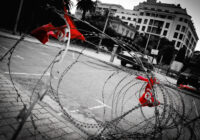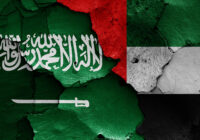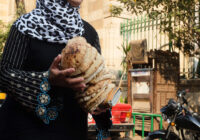The Kurds are unlikely to back down unless they receive an alternative deal, but this is unlikely to come from Baghdad.
The year was 1639. For the first time in their history, the Kurds of present-day Iran were separated from their brethren due to a treaty signed by the Ottoman and Safavid Empires. The final division of the Kurdish homeland came in 1923 when the Treaty of Lausanne divided it between four countries: Iraq, Iran, Turkey and Syria. The Kurds have been trying to establish their own state since 1639, but they have always failed. Since the Treaty of Lausanne, they have launched at least 12 uprisings to obtain independence or autonomy, but most them have ended in massacres, genocide or assimilation plans for the Kurds.
In June this year, the ruling parties of the Kurdistan Regional Government (KRG) in Iraq announced a referendum on Kurdish independence to be held on September 25, a decision that shocked both the Kurds and the international community. The main opposition parties see this as a dangerous move by the Patriotic Union of Kurdistan (PUK) and the Kurdistan Democratic Party (KDP) — who have been in power since 1992 — to extend their reach instead of solving the region’s political and economic crisis.
This is undoubtedly one of the reasons behind the vote, but the majority of Kurds have always wanted independence. However, considering the current turmoil in the Middle East, a recent poll suggests that some Kurds are still undecided over the benefits of a separate state, but the latest threats from Iran, Iraq and Turkey could also galvanize the yes vote.
WHY NOW?
It is clear that Kurdish aspirations for self-determination have played an important role in calling the referendum, but this is not the only motivation behind it. There are three reasons to focus on.
First, a driver behind the vote is to secure the disputed areas currently under control by Kurdish peshmerga forces. According to the Iraqi Constitution, Article 140, Baghdad is responsible for holding a referendum in these areas in order to let the people decide whether they want to be part of the Kurdistan region of Iraq or Baghdad. This constitutional right has never materialized.
In 2014, when the Islamic State (IS) went on the offensive and captured Mosul, the Iraqi army fled. With the support of the international, anti-IS coalition, the peshmerga fought back against the terrorist group. In turn, the Kurds took control of these disputed areas.
Today, the Kurds fear that, as soon as the Islamic State is defeated, Baghdad, with the support of the Shia-dominated Hashd al-Shaabi militia, might start challenging the Kurds on territorial issues and a renewal of bloodshed could ensue. In fact, Hashd al-Shaabi, which is backed by Iran, has already attempted to enter these regions, but they have been stopped by the Kurds.
The KRG, therefore, wants to use this referendum in order to start negotiations with Baghdad while it still has the upper hand to secure these zones.
Second, the current political and economic crisis between the KRG and Baghdad is another reason that has pushed the Kurdish government to insist on its right to hold a referendum. In 2014, Baghdad unconstitutionally cut the KRG’s budget over disagreements between the federal government and Erbil, which put the KDP and PUK under considerable political and economic pressure. At the time, then-Iraqi Prime Minister Nouri al-Maliki hoped this would end KRG President Masoud Barzani’s reign, but it backfired. Maliki and Barzani’s disagreements turned into a conflict between Shia-Arab nationalism versus Kurdish nationalism.
As a result of these disputes, the Kurds have come to realize that, in order to improve their economy, they have to use this referendum to impose their economic requests on Baghdad. However, in the long run, the KRG has understood that, without an independent state, its efforts to improve the regional economy will always be curtailed by Baghdad.
Third, domestic political issues have a key role to play behind the referendum. During the war against the Islamic State, the KDP, with the tacit help of the PUK’s silence, crippled the Kurdish parliament because the main opposition parties wanted to end the presidency of Barzani. Consequently, the KDP banned the speaker of parliament from going to the capital and also sent ministers from the Change Movement (Gorran) home. In turn, the Kurds were unsure over whether they should protest this move as they were fighting IS on their doorstep.
Nevertheless, in Gorran’s stronghold in the Sulaimaniyah province, public anger resulted in the burning down of KDP offices in October 2015. However, now that the Islamic State is no longer a threat, the main focus of the Kurds has shifted back to domestic affairs. As a result, lingering tensions have resurfaced and people are once again blaming Barzani and the PUK for the crippling corruption in the KRG and the dismissal of the democratically-elected parliament.
Both the KDP and the PUK are fully aware of the people’s anger, and it is undeniable that announcing this referendum has been a political masterstroke. Indeed, despite the people’s frustration at government corruption, independence remains their dream. So, the ruling parties have managed to quell the tension for the time being by tapping into the longstanding vision of an independent Kurdish state.
The announcement of the referendum is proving to work in favor of the KDP as it is dramatically changing the political landscape in the Kurdish region of Iraq. So far, it has started to harm the largest opposition group, the Gorran movement, which is splintering over the independence issue. Meanwhile, the PUK has remained silent because it has good relations with both Baghdad and Tehran, so it can come forward and negotiate if the situation deteriorates further. In essence, the KDP and the PUK have used the independence referendum to make a formidable alliance that has crushed internal opposition and extended their influence.
This referendum is crucial for the Kurds as the future of disputed areas, their economy and domestic politics, and their democracy depend on the outcome. If the Kurds do not obtain an alternative deal — as Barzani has said in his speeches during independence rallies — then the last option for the Kurds will be declaring independence instead of opting for maximum devolution in Iraq.
 Iraqi Prime Minister Haider al-Abadi has opposed any referendum attempts within the Kurdish region and disputed areas, but he has also failed to present any constructive dialogue to deal with this issue. Baghdad is trying to stop the vote, and this could result in direct or proxy wars against the Kurds by Iraq, Turkey and Iran.
Iraqi Prime Minister Haider al-Abadi has opposed any referendum attempts within the Kurdish region and disputed areas, but he has also failed to present any constructive dialogue to deal with this issue. Baghdad is trying to stop the vote, and this could result in direct or proxy wars against the Kurds by Iraq, Turkey and Iran.
The Kurds are unlikely to back down unless they receive an alternative deal, but this is unlikely to come from Baghdad. Indeed, the reaction from both the Iraqi government and the international community clearly demonstrates that the Kurds are seen as convenient pawns to be used on the geopolitical chessboard.
This is where the political masterstroke of the KRG — which, for the first time, has showed a degree of political savviness in declaring the referendum at this time — plays out. The Kurdish government has demonstrated that no party is able to offer an alternative that could benefit both sides, thereby proving to the international community that independence is the last option for the Kurds.
*[This article was updated on September 25, 2017.]
The views expressed in this article are the author’s own and do not necessarily reflect Fair Observer’s editorial policy.
Photo Credit: Serkan Senturk / Shutterstock.com
Support Fair Observer
We rely on your support for our independence, diversity and quality.
For more than 10 years, Fair Observer has been free, fair and independent. No billionaire owns us, no advertisers control us. We are a reader-supported nonprofit. Unlike many other publications, we keep our content free for readers regardless of where they live or whether they can afford to pay. We have no paywalls and no ads.
In the post-truth era of fake news, echo chambers and filter bubbles, we publish a plurality of perspectives from around the world. Anyone can publish with us, but everyone goes through a rigorous editorial process. So, you get fact-checked, well-reasoned content instead of noise.
We publish 2,500+ voices from 90+ countries. We also conduct education and training programs
on subjects ranging from digital media and journalism to writing and critical thinking. This
doesn’t come cheap. Servers, editors, trainers and web developers cost
money.
Please consider supporting us on a regular basis as a recurring donor or a
sustaining member.
Will you support FO’s journalism?
We rely on your support for our independence, diversity and quality.






